新世纪博士生综合英语Unit 6 Death and Justice课文及译文
- 格式:doc
- 大小:64.50 KB
- 文档页数:7
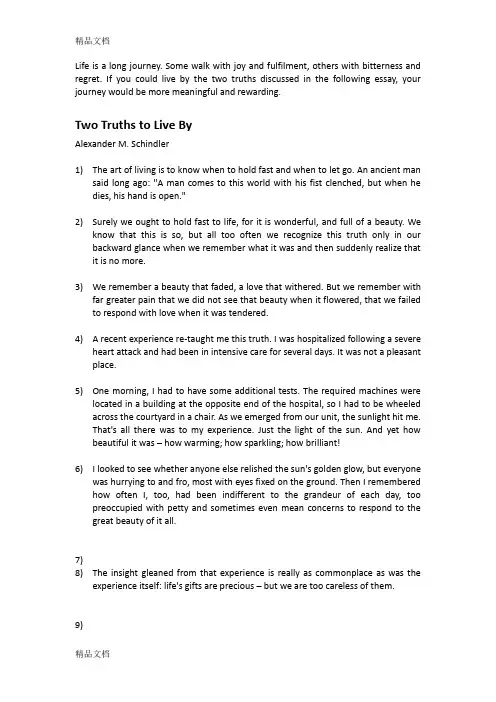
Life is a long journey. Some walk with joy and fulfilment, others with bitterness and regret. If you could live by the two truths discussed in the following essay, your journey would be more meaningful and rewarding.Two Truths to Live ByAlexander M. Schindler1)The art of living is to know when to hold fast and when to let go. An ancient mansaid long ago: "A man comes to this world with his fist clenched, but when he dies, his hand is open."2)Surely we ought to hold fast to life, for it is wonderful, and full of a beauty. Weknow that this is so, but all too often we recognize this truth only in our backward glance when we remember what it was and then suddenly realize that it is no more.3)We remember a beauty that faded, a love that withered. But we remember withfar greater pain that we did not see that beauty when it flowered, that we failed to respond with love when it was tendered.4) A recent experience re-taught me this truth. I was hospitalized following a severeheart attack and had been in intensive care for several days. It was not a pleasant place.5)One morning, I had to have some additional tests. The required machines werelocated in a building at the opposite end of the hospital, so I had to be wheeled across the courtyard in a chair. As we emerged from our unit, the sunlight hit me.That's all there was to my experience. Just the light of the sun. And yet how beautiful it was – how warming; how sparkling; how brilliant!6)I looked to see whether anyone else relished the sun's golden glow, but everyonewas hurrying to and fro, most with eyes fixed on the ground. Then I remembered how often I, too, had been indifferent to the grandeur of each day, too preoccupied with petty and sometimes even mean concerns to respond to the great beauty of it all.7)8)The insight gleaned from that experience is really as commonplace as was theexperience itself: life's gifts are precious – but we are too careless of them.9)10)Here then is the first pole of life's paradoxical demands on us: Never too busy forthe wonder and the awe of life. Be respectful before each dawning day. Embrace each hour. Seize each golden minute.11)12)Hold fast to life, but not so fast that you cannot let go. This is the second side oflife's coin, the opposite pole of its paradox: we must accept our losses, and learn how to let go.13)This is not an easy lesson to learn, especially when we are young and think thatthe world is ours to command, that whatever we desire with the full force of our passion can, and will be ours. But then life moves along to confront us with realities, and slowly but surely this second truth dawns upon us.14)At every stage of life we sustain losses – and grow in the process. We begin ourindependent lives only when we come to this world. We enter schools, then we leave our mothers and fathers and our childhood homes. We get married and have children and then have to let them go. We confront the death of our parents and our spouses. We face the gradual or not so gradual weakening of our own strength. And ultimately, we must confront the inevitability of our own death, losing ourselves, as it were, all that we were or dreamed to be.15)But why should we be reconciled to life's contradictory demands? Why fashionthings of beauty when beauty is short-lived? Why give our heart in love when those we love will ultimately be torn from our grasp?16)17)In order to resolve this paradox, we must seek a wider perspective, viewing ourlives as through windows that open on eternity. Once we do that, we realize that though our lives are finite, our deeds on earth weave a timeless pattern.18)19)Life is never just being. It is becoming, a relentless flowing on. Our parents liveon through us, and we will live on through our children. The institutions we build endure, and we will endure through them. The beauty we fashion cannot be dimmed by death. Our flesh may perish, our hands will wither, but the beauty and goodness and truth they create live on for all time to come.20)Don't spend and waste your lives accumulating objects that will only turn to dustand ashes. Pursue not so much the material as the ideal, for ideals alone invest life with meaning and are of enduring worth.21)Add love to a house and you have a home. Add righteousness to a city and youhave a community. Add truth to a pile of red brick and you have a school. Add justice to the far-flung round of human endeavor and you have civilization. Put them all together, elevate them above their present imperfections, add to them the vision of humankind redeemed, forever free of need and conflict and you have a future lighted with the radiant colors of hope.22)。
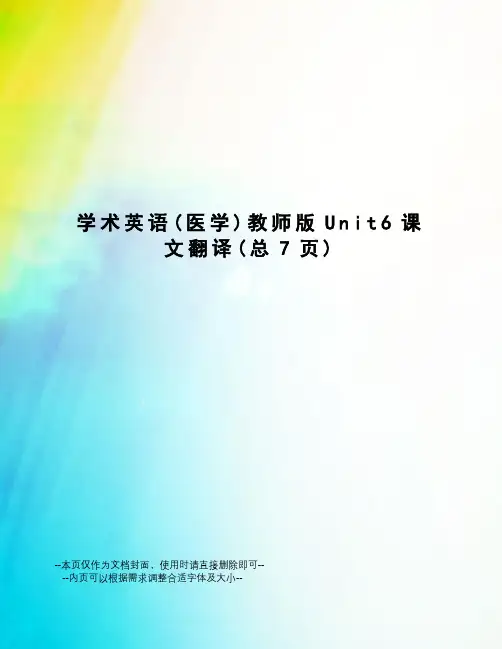
学术英语(医学)教师版U n i t6课文翻译(总7页)--本页仅作为文档封面,使用时请直接删除即可----内页可以根据需求调整合适字体及大小--Unit 6 Text A寻求临终护理数十年前,大多数人在自己家中去世,但是医疗方面的进步已经改变了这一情况。
如今,大多数美国人在医院或是疗养院中度过生命的最终时光。
他们中有些人是为了治疗疾病进了医院,有些可能是选择长期住在疗养院。
越来越多的人在生命的尽头开始选择临终关怀。
死亡没有一个称得上“合适”的地点。
何况,我们死亡的地方,大多数情况下也并非我们可以决定的。
但如果有选择的机会,每个人及其家属,都应该考虑究竟怎样的临终护理最为适合,在哪里可以享受到这样的关怀,家人和朋友能否提供帮助,以及他们应该如何支付相应的费用。
医院及疗养院64 岁的 George 有充血性心力衰竭病史。
一天晚上,他因为胸痛被送入医院。
他与他最亲近的人事先便已决定,在任何情况下都要让医生使用最大努力来延续他的生命。
所以当他需要相应的治疗时,他选择了医院,因为那里有全天候工作的医生和护士。
医院提供一整套的治疗、检查及其他医疗照护。
一旦 George 的心脏出现持续衰竭,医院的重症监护病房(ICU)或冠心病重症监护病房(CCU)就可以提供及时的救护。
尽管医院有相关的规定,在有些情况下执行具有一定的弹性。
如果 George 的医生认为他的病情并没有因为治疗有所好转,并濒临死亡,他的家属可以要求更加宽松的探视时间。
如果他的家属想从家中给他带一些私人物品,可以向工作人员询问物品的尺寸限制或是是否需要消毒。
不论 George 住在 ICU、CCU 还是两病床的病房,其家属都可以要求更多的私人空间。
在医院环境中,对临终病人来说,身边永远会有知道该如何照料他的医务人员。
这一点令病人及其家属得以安心。
已有越来越多的人在生命尽头的时候选择疗养院,因为在这里,护理人员是随叫随到的。
疗养院有时也被称为专业护理所,在临终护理方面有利有弊。
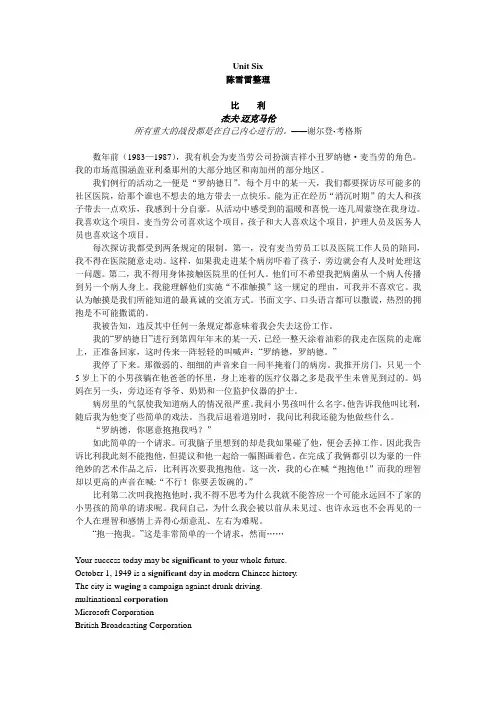
Unit Six陈雪雷整理比利杰夫·迈克马伦所有重大的战役都是在自己内心进行的。
——谢尔登·考格斯数年前(1983—1987),我有机会为麦当劳公司扮演吉祥小丑罗纳德·麦当劳的角色。
我的市场范围涵盖亚利桑那州的大部分地区和南加州的部分地区。
我们例行的活动之一便是“罗纳德日”。
每个月中的某一天,我们都要探访尽可能多的社区医院,给那个谁也不想去的地方带去一点快乐。
能为正在经历“消沉时期”的大人和孩子带去一点欢乐,我感到十分自豪。
从活动中感受到的温暖和喜悦一连几周萦绕在我身边。
我喜欢这个项目,麦当劳公司喜欢这个项目,孩子和大人喜欢这个项目,护理人员及医务人员也喜欢这个项目。
每次探访我都受到两条规定的限制。
第一,没有麦当劳员工以及医院工作人员的陪同,我不得在医院随意走动。
这样,如果我走进某个病房吓着了孩子,旁边就会有人及时处理这一问题。
第二,我不得用身体接触医院里的任何人。
他们可不希望我把病菌从一个病人传播到另一个病人身上。
我能理解他们实施“不准触摸”这一规定的理由,可我并不喜欢它。
我认为触摸是我们所能知道的最真诚的交流方式。
书面文字、口头语言都可以撒谎,热烈的拥抱是不可能撒谎的。
我被告知,违反其中任何一条规定都意味着我会失去这份工作。
我的“罗纳德日”进行到第四年年末的某一天,已经一整天涂着油彩的我走在医院的走廊上,正准备回家,这时传来一阵轻轻的叫喊声:“罗纳德,罗纳德。
”我停了下来。
那微弱的、细细的声音来自一间半掩着门的病房。
我推开房门,只见一个5岁上下的小男孩躺在他爸爸的怀里,身上连着的医疗仪器之多是我平生未曾见到过的。
妈妈在另一头,旁边还有爷爷、奶奶和一位监护仪器的护士。
病房里的气氛使我知道病人的情况很严重。
我问小男孩叫什么名字,他告诉我他叫比利,随后我为他变了些简单的戏法。
当我后退着道别时,我问比利我还能为他做些什么。
“罗纳德,你愿意抱抱我吗?”如此简单的一个请求。
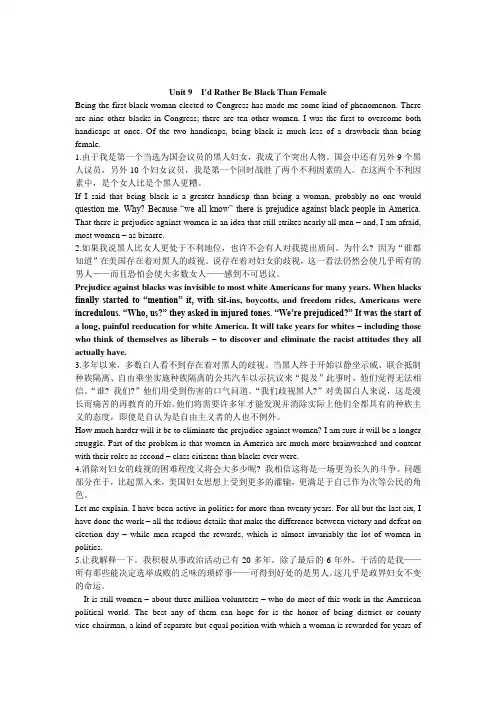
Unit 9 I'd Rather Be Black Than FemaleBeing the first black woman elected to Congress has made me some kind of phenomenon. There are nine other blacks in Congress; there are ten other women. I was the first to overcome both handicaps at once. Of the two handicaps, being black is much less of a drawback than being female.1.由于我是第一个当选为国会议员的黑人妇女,我成了个突出人物。
国会中还有另外9个黑人议员,另外10个妇女议员,我是第一个同时战胜了两个不利因素的人。
在这两个不利因素中,是个女人比是个黑人更糟。
If I said that being black is a greater handicap than being a woman, probably no one would question me. Why? Because ―we all know‖ there is prejudice against black people in America. That there is prejudice against women is an idea that still strikes nearly all men – and, I am afraid, most women – as bizarre.2.如果我说黑人比女人更处于不利地位,也许不会有人对我提出质问。
为什么? 因为“谁都知道”在美国存在着对黑人的歧视。
说存在着对妇女的歧视,这一看法仍然会使几乎所有的男人——而且恐怕会使大多数女人——感到不可思议。
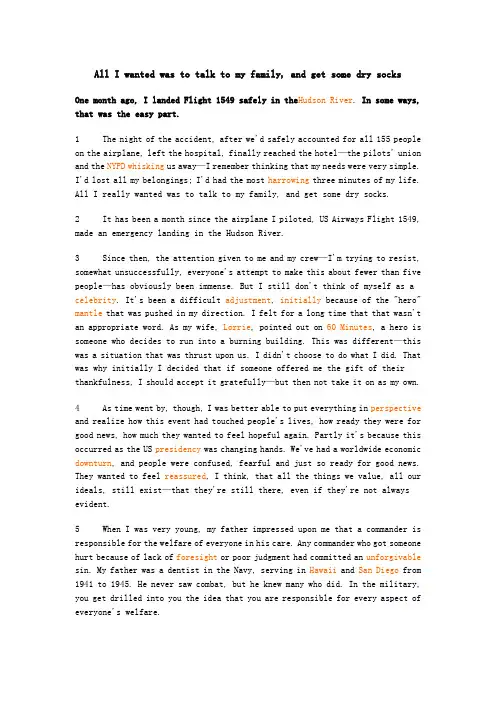
All I wanted was to talk to my family, and get some dry socksOne month ago, I landed Flight 1549 safely in the Hudson River. In some ways, that was the easy part.1 The night of the accident, after we'd safely accounted for all 155 people on the airplane, left the hospital, finally reached the hotel—the pilots' union and the NYPD whisking us away—I remember thinking that my needs were very simple. I'd lost all my belongings; I'd had the most harrowing three minutes of my life. All I really wanted was to talk to my family, and get some dry socks.2 It has been a month since the airplane I piloted, US Airways Flight 1549, made an emergency landing in the Hudson River.3 Since then, the attention given to me and my crew—I'm trying to resist, somewhat unsuccessfully, everyone's attempt to make this about fewer than five people—has obviously been immense. But I still don't think of myself as a celebrity. It's been a difficult adjustment, initially because of the "hero" mantle that was pushed in my direction. I felt for a long time that that wasn't an appropriate word. As my wife, Lorrie, pointed out on 60 Minutes, a hero is someone who decides to run into a burning building. This was different—this was a situation that was thrust upon us. I didn't choose to do what I did. That was why initially I decided that if someone offered me the gift of their thankfulness, I should accept it gratefully—but then not take it on as my own.4 As time went by, though, I was better able to put everything in perspective and realize how this event had touched people's lives, how ready they were for good news, how much they wanted to feel hopeful again. Partly it's because this occurred as the US presidency was changing hands. We've had a worldwide economic downturn, and people were confused, fearful and just so ready for good news. They wanted to feel reassured, I think, that all the things we value, all our ideals, still exist—that they're still there, even if they're not always evident.5 When I was very young, my father impressed upon me that a commander is responsible for the welfare of everyone in his care. Any commander who got someone hurt because of lack of foresight or poor judgment had committed an unforgivable sin. My father was a dentist in the Navy, serving in Hawaii and San Diego from 1941 to 1945. He never saw combat, but he knew many who did. In the military, you get drilled into you the idea that you are responsible for every aspect of everyone's welfare.6 During every minute of the flight, I was confident I could solve the next problem. My first officer, Jeff Skiles, and I did what airline pilots do: We followed our training, and our philosophy of life. We valued every life on that airplane and knew it was our responsibility to try to save each one, in spite of the sudden and complete failure of our aircraft. We never gave up. Having a plan enabled us to keep our hope alive. Perhaps in a similar fashion, people who are in their own personal crises—a pink slip, a foreclosure—can be reminded that no matter how dire the circumstance, or how little time you have to deal with it, further action is always possible. There's always a way out of even the tightest spot. You can survive.7 Even though we had a successful outcome, it's human nature to wonder about the what-ifs. The second-guessing was much more frequent, and intense, in the first few days at night, when I couldn't sleep. It was hard to shut my brain off and get back to sleep. Sometimes I didn't, I couldn't. It was part of the post-traumatic stress that we have all felt, that each of the crew members has reported to each other.8 It's funny—for the first two weeks after the accident, Jeff kept telling me, "I just want my old life back." But the other day he finally said for the first time, "You know, this is OK. I'm learning to like this. This is good."I think he's coming to terms with what's happened. He realizes that he's entitled to the attention. That he can still be true to himself. That accepting it isn't selling out.9 Besides the outpouring of support from the passengers, the most touching sentiments I have received have been from other pilots. They tell me that because of the years of economic difficulties faced by the airline industry and its employees and the decreased respect for the profession, they have not felt proud to go to work—some of them for decades. Now, they tell me, they do. And they thank me for that. They thank us, the crew, because we've reminded people what all of us do every day, what's really at stake. They feel like they've regained some of the respect they'd lost.10 What's next? I will return to flying for my airline—when I'm ready. I'm not sure when that will be. Probably a few months. I still haven't had many nights at home. My family and I are trying hard to remain true to ourselves and not let this change us, but there's a steep learning curve. The trajectory of our lives has changed forever. And we're determined to make good come out of this in every way that we can.我想要的只是与家人说话和几双干袜子一个月前,我安全地将1549号航班停在了哈得孙河。
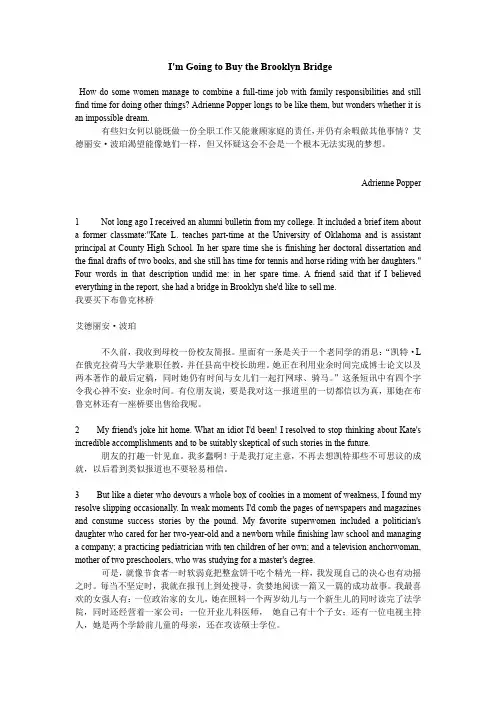
I'm Going to Buy the Brooklyn BridgeHow do some women manage to combine a full-time job with family responsibilities and still find time for doing other things? Adrienne Popper longs to be like them, but wonders whether it is an impossible dream.有些妇女何以能既做一份全职工作又能兼顾家庭的责任,并仍有余暇做其他事情?艾德丽安·波珀渴望能像她们一样,但又怀疑这会不会是一个根本无法实现的梦想。
Adrienne Popper1 Not long ago I received an alumni bulletin from my college. It included a brief item abouta former classmate:"Kate L. teaches part-time at the University of Oklahoma and is assistant principal at County High School. In her spare time she is finishing her doctoral dissertation and the final drafts of two books, and she still has time for tennis and horse riding with her daughters." Four words in that description undid me: in her spare time. A friend said that if I believed everything in the report, she had a bridge in Brooklyn she'd like to sell me.我要买下布鲁克林桥艾德丽安·波珀不久前,我收到母校一份校友简报。
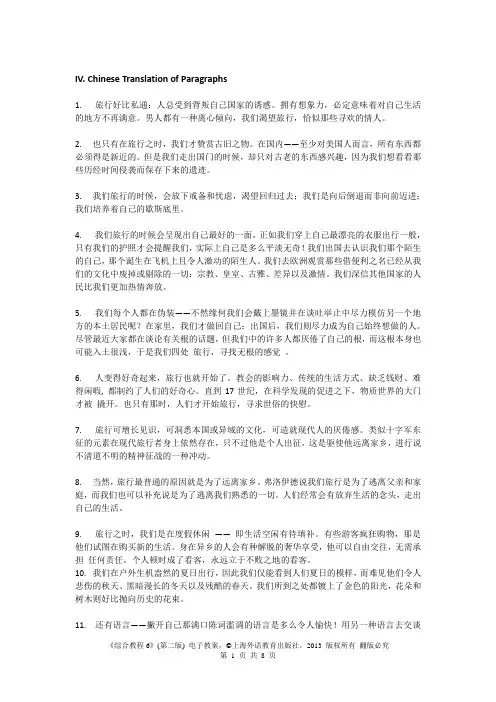
IV. Chinese Translation of Paragraphs1. 旅行好比私通:人总受到背叛自己国家的诱惑。
拥有想象力,必定意味着对自己生活的地方不再满意。
男人都有一种离心倾向,我们渴望旅行,恰似那些寻欢的情人。
2. 也只有在旅行之时,我们才赞赏古旧之物。
在国内——至少对美国人而言,所有东西都必须得是新近的。
但是我们走出国门的时候,却只对古老的东西感兴趣,因为我们想看看那些历经时间侵袭而保存下来的遗迹。
3. 我们旅行的时候,会放下戒备和忧虑,渴望回归过去;我们是向后倒退而非向前迈进;我们培养着自己的歇斯底里。
4. 我们旅行的时候会呈现出自己最好的一面,正如我们穿上自己最漂亮的衣服出行一般,只有我们的护照才会提醒我们,实际上自己是多么平淡无奇!我们出国去认识我们那个陌生的自己,那个诞生在飞机上且令人激动的陌生人。
我们去欧洲观赏那些借便利之名已经从我们的文化中废掉或剔除的一切:宗教、皇室、古雅、差异以及激情。
我们深信其他国家的人民比我们更加热情奔放。
5. 我们每个人都在伪装——不然缘何我们会戴上墨镜并在谈吐举止中尽力模仿另一个地方的本土居民呢?在家里,我们才做回自己;出国后,我们则尽力成为自己始终想做的人。
尽管最近大家都在谈论有关根的话题,但我们中的许多人都厌倦了自己的根,而这根本身也可能入土很浅,于是我们四处旅行,寻找无根的感觉。
6. 人变得好奇起来,旅行也就开始了。
教会的影响力、传统的生活方式、缺乏钱财、难得闲暇, 都制约了人们的好奇心。
直到17世纪,在科学发现的促进之下,物质世界的大门才被撬开。
也只有那时,人们才开始旅行,寻求世俗的快慰。
7. 旅行可增长见识,可洞悉本国或异域的文化,可造就现代人的厌倦感。
类似十字军东征的元素在现代旅行者身上依然存在,只不过他是个人出征,这是驱使他远离家乡,进行说不清道不明的精神征战的一种冲动。
8. 当然,旅行最普通的原因就是为了远离家乡。
弗洛伊德说我们旅行是为了逃离父亲和家庭,而我们也可以补充说是为了逃离我们熟悉的一切。
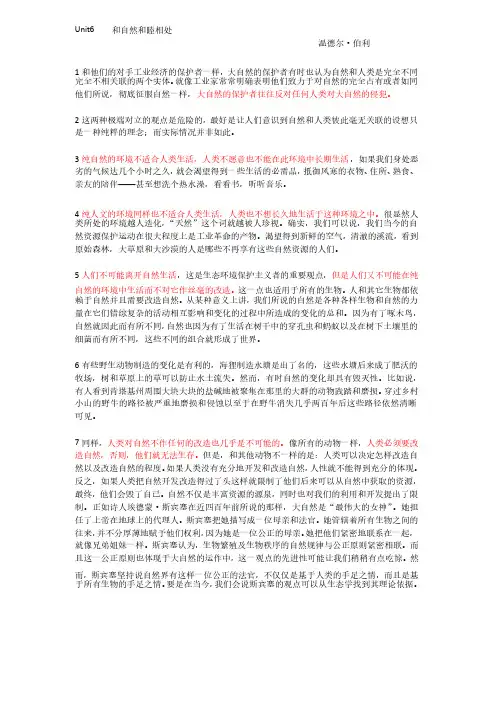
Unit6 和自然和睦相处温德尔·伯利1和他们的对手工业经济的保护者一样,大自然的保护者有时也认为自然和人类是完全不同完全不相关联的两个实体。
就像工业家常常明确表明他们致力于对自然的完全占有或者如同他们所说,彻底征服自然一样,他们所说,彻底征服自然一样,大自然的保护者往往反对任何人类对大自然的侵犯。
大自然的保护者往往反对任何人类对大自然的侵犯。
2这两种极端对立的观点是危险的,最好是让人们意识到自然和人类彼此毫无关联的设想只是一种纯粹的理念;而实际情况并非如此。
3纯自然的环境不适合人类生活,人类不愿意也不能在此环境中长期生活,如果我们身处恶劣的气候达几个小时之久,就会渴望得到一些生活的必需品,抵御风寒的衣物、住所、熟食、亲友的陪伴——甚至想洗个热水澡,看看书,听听音乐。
4纯人文的环境同样也不适合人类生活,人类也不想长久地生活于这种环境之中。
很显然人类所处的环境越人造化,“天然”这个词就越被人珍视。
确实,我们可以说,我们当今的自然资源保护运动在很大程度上是工业革命的产物。
然资源保护运动在很大程度上是工业革命的产物。
渴望得到新鲜的空气,渴望得到新鲜的空气,渴望得到新鲜的空气,清澈的溪流,清澈的溪流,看到原始森林,大草原和大沙漠的人是哪些不再享有这些自然资源的人们。
5人们不可能离开自然生活,这是生态环境保护主义者的重要观点,,这是生态环境保护主义者的重要观点,但是人们又不可能在纯但是人们又不可能在纯自然的环境中生活而不对它作丝毫的改造。
这一点也适用于所有的生物。
人和其它生物都依赖于自然并且需要改造自然。
从某种意义上讲,我们所说的自然是各种各样生物和自然的力量在它们错综复杂的活动相互影响和变化的过程中所造成的变化的总和。
因为有了啄木鸟,自然就因此而有所不同,自然也因为有了生活在树干中的穿孔虫和蚂蚁以及在树下土壤里的细菌而有所不同,这些不同的组合就形成了世界。
6有些野生动物制造的变化是有利的,海狸制造水塘是出了名的,这些水塘后来成了肥沃的牧场,树和草原上的草可以防止水土流失。
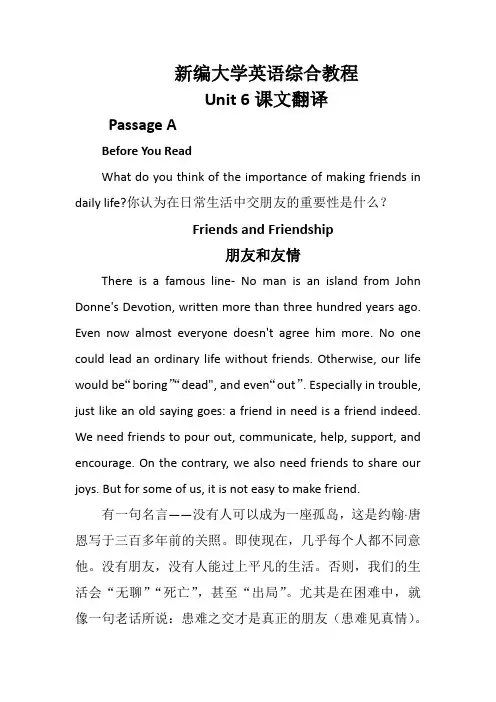
新编大学英语综合教程Unit 6课文翻译Passage ABefore You ReadWhat do you think of the importance of making friends in daily life?你认为在日常生活中交朋友的重要性是什么?Friends and Friendship朋友和友情There is a famous line- No man is an island from John Donne's Devotion, written more than three hundred years ago. Even now almost everyone doesn't agree him more. No one could lead an ordinary life without friends. Otherwise, our life would be“boring”“dead", and even“out”. Especially in trouble, just like an old saying goes: a friend in need is a friend indeed. We need friends to pour out, communicate, help, support, and encourage. On the contrary, we also need friends to share our joys. But for some of us, it is not easy to make friend.有一句名言——没有人可以成为一座孤岛,这是约翰·唐恩写于三百多年前的关照。
即使现在,几乎每个人都不同意他。
没有朋友,没有人能过上平凡的生活。
否则,我们的生活会“无聊”“死亡”,甚至“出局”。
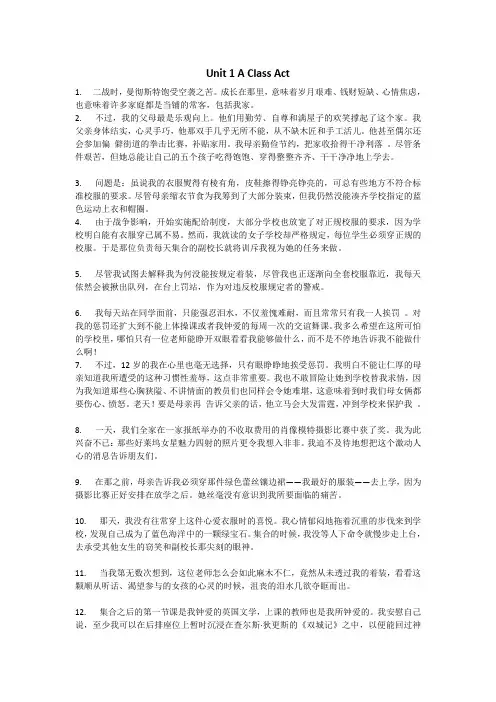
Unit 1 A Class Act1. 二战时,曼彻斯特饱受空袭之苦。
成长在那里,意味着岁月艰难、钱财短缺、心情焦虑,也意味着许多家庭都是当铺的常客,包括我家。
2. 不过,我的父母最是乐观向上。
他们用勤劳、自尊和满屋子的欢笑撑起了这个家。
我父亲身体结实,心灵手巧,他那双手几乎无所不能,从不缺木匠和手工活儿。
他甚至偶尔还会参加偏僻街道的拳击比赛,补贴家用。
我母亲勤俭节约,把家收拾得干净利落。
尽管条件艰苦,但她总能让自己的五个孩子吃得饱饱、穿得整整齐齐、干干净净地上学去。
3. 问题是:虽说我的衣服熨得有棱有角,皮鞋擦得铮亮铮亮的,可总有些地方不符合标准校服的要求。
尽管母亲缩衣节食为我筹到了大部分装束,但我仍然没能凑齐学校指定的蓝色运动上衣和帽圈。
4. 由于战争影响,开始实施配给制度,大部分学校也放宽了对正规校服的要求,因为学校明白能有衣服穿已属不易。
然而,我就读的女子学校却严格规定,每位学生必须穿正规的校服。
于是那位负责每天集合的副校长就将训斥我视为她的任务来做。
5. 尽管我试图去解释我为何没能按规定着装,尽管我也正逐渐向全套校服靠近,我每天依然会被揪出队列,在台上罚站,作为对违反校服规定者的警戒。
6. 我每天站在同学面前,只能强忍泪水,不仅羞愧难耐,而且常常只有我一人挨罚。
对我的惩罚还扩大到不能上体操课或者我钟爱的每周一次的交谊舞课。
我多么希望在这所可怕的学校里,哪怕只有一位老师能睁开双眼看看我能够做什么,而不是不停地告诉我不能做什么啊!7. 不过,12岁的我在心里也毫无选择,只有眼睁睁地挨受惩罚。
我明白不能让仁厚的母亲知道我所遭受的这种习惯性羞辱,这点非常重要。
我也不敢冒险让她到学校替我求情,因为我知道那些心胸狭隘、不讲情面的教员们也同样会令她难堪,这意味着到时我们母女俩都要伤心、愤怒。
老天!要是母亲再告诉父亲的话,他立马会大发雷霆,冲到学校来保护我。
8. 一天,我们全家在一家报纸举办的不收取费用的肖像模特摄影比赛中获了奖。
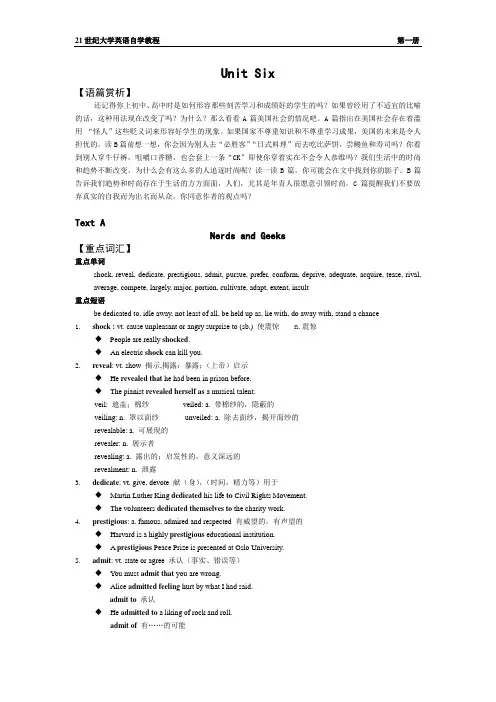
Unit Six【语篇赏析】还记得你上初中、高中时是如何形容那些刻苦学习和成绩好的学生的吗?如果曾经用了不适宜的比喻的话,这种用法现在改变了吗?为什么?那么看看A篇美国社会的情况吧。
A篇指出在美国社会存在着滥用“怪人”这些贬义词来形容好学生的现象。
如果国家不尊重知识和不尊重学习成果,美国的未来是令人担忧的。
读B篇前想一想,你会因为别人去“必胜客”“日式料理”而去吃比萨饼,尝鳗鱼和寿司吗?你看到别人穿牛仔裤,咀嚼口香糖,也会套上一条“CK”即使你穿着实在不会令人恭维吗?我们生活中的时尚和趋势不断改变,为什么会有这么多的人追逐时尚呢?读一读B篇,你可能会在文中找到你的影子。
B篇告诉我们趋势和时尚存在于生活的方方面面,人们,尤其是年青人很愿意引领时尚。
C篇提醒我们不要放弃真实的自我而为出名而从众。
你同意作者的观点吗?Text ANerds and Geeks【重点词汇】重点单词shock, reveal, dedicate, prestigious, admit, pursue, prefer, conform, deprive, adequate, acquire, tease, rival, average, compete, largely, major, portion, cultivate, adapt, extent, insult重点短语be dedicated to, idle away, not least of all, be held up as, lie with, do away with, stand a chance1.shock : vt.cause unpleasant or angry surprise to (sb.)使震惊 n.震惊◆People are really shocked.◆An electric shock can kill you.2.reveal: vt. show 揭示,揭露;暴露;(上帝)启示◆He revealed that he had been in prison before.◆The pianist revealed herself as a musical talent.veil: 遮盖;棉纱veiled: a. 带棉纱的,隐蔽的veiling: n. 罩以面纱unveiled: a. 除去面纱,揭开面纱的revealable: a. 可展现的revealer: n. 展示者revealing: a. 露出的;启发性的,意义深远的revealment: n. 泄露3.dedicate: vt. give, devote 献(身),(时间,精力等)用于◆Martin Luther King dedicated his life to Civil Rights Movement.◆The volunteers dedicated themselves to the charity work.4.prestigious: a. famous, admired and respected 有威望的,有声望的◆Harvard is a highly prestigious educational institution.◆ A prestigious Peace Prize is presented at Oslo University.5.admit: vt. state or agree 承认(事实、错误等)◆You must admit that you are wrong.◆Alice admitted feeling hurt by what I had said.admit to承认◆He admitted to a liking of rock and roll.admit of有……的可能◆This work admits of no delay. 这个工作刻不容缓。
第二单元1.成长在二战期间战火连天的曼彻斯特意味着生活艰辛,金钱紧缺,整日焦虑不安,当铺成了大多数家庭经常去的地方,当然也包括我家。
2.然而,我不能对已经很有进取心和积极乐观的父母有更多的要求了。
他们艰辛地工作,用尊严和快乐来支撑着这个家庭。
我刚毅而又智慧的父亲几乎无所不能,而且从不缺木匠和手工艺活。
为了满足家庭开支,他甚至参加了非法组织的拳击比赛。
至于我的母亲,她勤劳节约,极爱干净。
即使条件艰苦,在母亲的照料下,她的五个孩子总能吃得饱饱地,穿得干干净净地去学校。
3.尽管我的衣服熨得很平整,鞋子擦得发亮,还是不符合学校的着装标准。
尽管妈妈勤俭持家,想办法为我们做衣服,但是我还是没有学校指定的蓝色校服和帽徽。
4.由于战争,政府实施定量配给制。
很多学校都放宽了对学生着装的要求,因为他们知道在那个时候弄到衣服是一件很困难的事情。
尽管如此,我所在的女子学校对着装的要求依旧很严格,每个学生必须要穿学校指定的校服。
所以,每天主持校会的副校长就把教我一个人如何着装当成了他的工作。
5.虽然我努力地向老师说明我不能遵守的理由,并且事实上,我也在努力地改进,但是每天老师都会把我从队伍中拉出来,然后让我站到台上,作为不穿校服到学校的学生的典型。
6.每天,当我独自一人尴尬地站在同学们的面前时,我都会强忍住泪水。
为了惩罚我,老师甚至不允许我参加体操队,也不允许我参加我最喜欢的每周一次的交易舞会。
我多么希望在这所可怕的学校里,能有这样一位老师,他会睁开双眼,然后看看我会做什么,而不是不断地告诉我不能做什么。
7.然而,在我十二岁的记忆中,除了接受惩罚我别无选择。
不要让我善良的母亲知晓这种惯例的惩罚对我而言是很重要的,我不敢冒险让她来学校为我说情,因为我知道心胸狭隘、不讲情面的教员会同样地使她难堪,那意味着我们俩都会不愉快、会有失颜面。
千万不要啊,如果她告诉我父亲的话,他将会立即为我大动干戈。
10.后来有一天,我们家赢得了一个报刊比赛,可以免费照相。
全新版大学英语综合教程 6课文翻译引言全新版大学英语综合教程作为大学英语综合教材的经典之一,在帮助学生提升英语综合能力方面发挥着重要作用。
本篇文档将对全新版大学英语综合教程第六单元的课文进行翻译,以帮助学生更好地理解和掌握课文内容。
课文翻译Unit 6 A Brave GirlPart 1 Warming UpText ALydia was a 14-year-old girl living with her family in a small village. One day, when she was walking through the village, she saw some children dressed in rags, sitting on the ground and begging. She was deeply moved by their miserable lives and decided to do something to help them.Lydia went home and shared her thoughts with her family. With their support, she started making dolls and selling them to raise money for the poor children. Each doll was carefully handmade with love. The dolls became very popular in thevillage and many people were touched by Lydia’s kindness and determination.As time went on, the number of dolls Lydia made increased. She recruited other volunteers to help her. The volunteers came from different backgrounds but all shared the same goal – to make a difference in the lives of those in need. The enthusiasm and ded ication of the volunteers made Lydia’s project more successful than she had ever imagined.The money raised from selling the dolls was used to provide food, clothing, and education for the poor children. The lives of these children gradually improved, and they began to have hope for a better future. Lydia’s project not only changed the lives of many children but also inspired kindness and compassion in the hearts of people around the village.Lydia’s efforts didn’t stop there. She continued to work hard and expand her project. Her goal was to reach out to as many children as possible, giving them the love and support they deserved. Lydia’s story touched many people, and her project received support and recognition from organizations and individuals both within and outside the village.Lydia’s brave actions and determination taught us that one person can make a difference. She showed us that even the smallest act of kindness can have a ripple effect and bring positive change to the lives of others. Inspired by her story, let us also take action and make a difference in the world.第六单元一个勇敢的女孩第一部分热身活动课文A莉迪亚是一个14岁的女孩,与家人住在一个小村庄里。
Lesson6 Being There 6.游过某地旅行好比通奸:一个人总是怀着对自己国家不忠的企图,就算是只想象一下旅游这件事就不可避免地对你所住的地方产生不满意。
人的身体里总有着一种向外跑的倾向。
我们的这种到处跑的嗜好使我们变得像两个偷情的人一般:期待圆房。
只有在旅行过程中,我们才能体验到岁月的魅力。
在国内,至少对美国人是这样,任何东西都必须是年轻的、新颖的,但是到了国外,我们却唯独钟情于年代久远的事物。
我们想见的是那些历经岁月洗礼却幸存下来的事物。
当旅行时,我们可以放下自己的防卫、紧张,甚至为了逃避目前的忧虑回到从前也无妨,退回到过去而不是继续向前,也可以任自己的情绪随意爆发。
在旅行时,我们仿佛穿上了自己最漂亮的衣服,呈现的是最完美的自我。
只有我们的护照还在提醒我们实际上还是普通人。
我们到国外去是去见另一个“自我”——那个在飞机上降生的令人激动万分的陌生人。
我们将会在欧洲看到在我们的文化中以方便之名(美其名曰为了方便)去掉或删除掉的任何东西,比如宗教、王权、自然之美、异质性和激情。
而且我们的脑袋里一根筋地认为其它民族比我们更富于激情。
我们每个人内心深处都有一个伪装的自己,要不是这样的话,我们为什么要戴上黑眼镜,努力在言行上装出和其它地方的当地人一样呢?在家的时候,我们伪装自己,当出国时,我们可以努力成为一直想成为的人。
姑且不论最近都在谈到的寻根问题,我们中很多人都已经厌倦了自己的根脉,也许是因为根还没有扎得很深的缘故吧,所以我们旅行是为了不受根脉问题的羁绊,享受充分地自由。
人类变得好奇之时,便是旅行起航之日。
17世纪之前,囿于宗教的束缚,传统生活方式的羁绊、金钱和闲暇时间的匮乏,人们的好奇心受到了限制。
在种种科学发现的推动下,物质世界的大门被愕然打开了。
直到那时,为了寻找非宗教的东西,人们才开始了旅行。
当人类开始变得世故,看清自己文化的本质甚至是超越了自己的文化,并养成了对任何东西都感到厌倦的现代能力时,外出旅行就应运而生了。
Unit4TextA|工作、劳动和嬉戏Work,Labor,andPlay威斯坦·H·奥登PrefaceWegotoworkeverydayandwethinkweareworkers.However,afterreadingAuden'sdiscussionabout work,labor,andplay,themajorityofusmayfindthatwearenolonger"workers".Whatarewethen?就我所知,汉娜·阿伦特小姐是界定工作和劳动之间实质区其余第一人。
一个人要想快乐,第一要有自由感,第二要确信自己有价值。
假如社会迫使一个人去做他自己不喜爱的事,或许说,他所喜爱做的事被社会忽略,看作没有价值或不重要,那他就不会真实快乐。
在一个严格意义上已取销奴隶制的社会里,一个人做的事情能否拥有社会价值取决于他能否为达成此项工作获取了酬劳。
但是,今日的劳动者能够被称为货真价实的薪资奴隶。
假如社会给一个人供给一份他自己不感兴趣的工作,他出于养家生活的需要不得已才从事这项工作,那这个人就是一个劳动者。
SofarasIknow,MissHannahArendtwasthefirstpersontodefinetheessentialdifferencebetweenworkand labor.Tobehappy,amanmustfeel,firstly,freeand,secondly,important.Hecannotbereallyhappyifhei scompelledbysocietytodowhathedoesnotenjoydoing,orifwhatheenjoysdoingisignoredbysocietyasof novalueorimportance.Inasocietywhereslaveryinthestrictsensehasbeenabolished,whetherwhataman doeshassocialvaluedependsonwhetherheispaidmoneytodoit,butalaborertodaycanrightlybecalledaw ageslave.Amanisalaborerifthejobsocietyoffershimisofnointeresttohimselfbutheiscompelledtota keitbythenecessityofearningalivingandsupportinghisfamily.与劳动相对的是嬉戏。
课文参考译文unit2Text A交通污染与心脏病致死有关联?1一项新的研究表明,居住在交通密度大的地段附近的中年人及年纪较大的人死于心脏病的可能性较高,但如果他们搬到交通不那么繁忙的地区,这一几率就可能下降。
2研究者说,此项发现并没有证明交通污染是高心脏病死亡率的直接原因,但的确为车辆污染物和心脏病致死之间的联系提供了更多证据。
3美国心脏病协会五月份公布的一份报告中指出,近期各项研究都极大地证明由交通,工业和发电导致的空气污染是引起心脏病、中风及其他心血管疾病所致的死亡的一个危险因素。
4大量的证据都指向燃烧汽油及其他矿物燃料所产生的称作细颗粒物的微粒。
5美国心脏病协会建议已患心脏病及其他疾病的高危人群——包括老年人和有糖尿病、高血压等潜在心脏病危险的人——尽量不要到交通拥挤的道路上去,同时也应尽量在空气质量较差的白天减少外出。
6最近的这一次研究结果是加拿大温哥华英属哥伦比亚大学的学者分析了超过四十五万名四十五至八十五岁之间的温哥华居民得出的。
7他们发现近九年来,长期居住在离公路五百英尺或离主干道一百六十五英尺范围内的居民比那些住在远离高密度交通路段的人更容易死于心脏病。
8但关于交通和心脏病死亡的关系,研究者发现了“两个新变化”,英属哥伦比亚大学环境卫生专业的教授,高级研究员迈克尔·布劳尔博士解释说。
9那就是,在研究期间搬离高密度交通地段的人心脏病死亡的几率会降低,而那些搬到靠近交通拥挤路段的人此项危险会升高。
10“这有点儿像我们在戒烟研究中看到的,”布劳尔在一次采访中说,“与长期持续吸烟者相比,那些已经戒烟的人患相关疾病的几率要低一些。
”11配合这次研究的居民有四十五万零二百八十三人,都在中年或以上年龄,事先并不知道自己有否心脏疾病。
其中将近五万三千人在九年的研究期间一直居住在离公路五百英尺或离主干道一百六十五英尺范围内。
12在这些居民中,有六百零七人,也就是超过百分之一的人在研究期间死于心脏病。
Unit 6:Death and JusticeHow Capital Punishment Affirms LifeBy Edward I. Koch死亡与司法死刑如何肯定生命Edward I. Koch st December a man named Robert Lee Willie, who had been convicted of raping and murdering an eighteen-year-old woman, was executed in the Louisiana state prison. In a statement issued several minutes before his death, Mr. Willie said: “Killing people is wrong… It makes no difference whether it’s citizens, countries, or governments. Killing is wrong.” Two weeks later in South Carolina, an admitt ed killer named Joseph Carl Shaw was put to death for murdering two teenagers. In an appeal to the governor for clemency, Mr. Shaw wrote: “Killing was wrong when I did it. Killing was wrong when you do it. I hope you have the courage and moral strength to stop the killing.”去年12月,一个名叫罗伯特.李.威利的罪犯在路易斯安那州的监狱中被处决,罪名是强奸和谋杀一名18岁的女子。
在其死亡前几分钟发表的一份声明中,威利先生说:“杀人是错误的... ... 无论是公民、国家,还是政府,都没有区别。
杀人是不对的”。
两周后在南卡罗来纳州,一个名为约瑟夫.卡尔.肖的杀人犯因为杀害两名青少年被处死。
在上诉到州长请求宽恕时,肖先生说:“当我杀人时杀人是错误的。
当你杀人时杀人也是错误的。
我希望你有勇气和道德力量来阻止杀戮。
”2.It is a curiosity of modern life that we find ourselves being lectured on morality by cold-blooded killers. Mr. Willie previously had been convicted of aggravated rape, aggravated kidnapping, and the murders of a Louisiana deputy and a man from Missouri. Mr. Shaw committed another murder a week before the two for which he was executed, and admitted mutilating the body of the fourteen-year-old girl he killed. I can’t help wondering what prompted these murderers to speak out against killing as they entered the death-house door. Did their newfound reverence for life stem from the realization that they were about to lose their own?冷血的杀人犯对我们进行道德说教,这真是现代社会的一件奇事。
威利先生之前已经犯有恶性强奸罪、恶性绑架罪和谋杀一名路易斯安那州副州长和一名密苏里州人的谋杀罪。
肖先生在杀害致其被处死的两个人的一周前,还进行了另一起谋杀,他承认肢解了他所杀害的14岁女孩的身体。
我不禁要问,是什么原因促使这些凶手在走入鬼门关的时候发表反对杀人的言论。
他们重新发现对生命的尊重是源于意识到即将失去自己的生命了吗?3.Life is indeed precious, and I believe the death penalty helps to affirm this fact. Had the death penalty been a real possibility in the minds of these murderers, they might well have stayed their hand. They might have shown moral awareness before their victims died, and not after. Consider the tragic death of Rosa Velez, who happened to be home when a man named Luis Vera burglarized her apartment in Brooklyn. “Yeah, I shot her,” Vera admitted. “She knew me, and I knew I wouldn’t go to the chair.”生命无疑是宝贵的,我相信死刑可以肯定这一事实。
如果这些杀人犯脑子里真想到过死刑的话,他们就可能会手下留情,就应该会在受害者死亡之前而不是之后表现出道德良知。
考虑罗莎.贝莱斯的悲惨死亡,当一个名为路易斯.维拉的人在她布鲁克林的公寓内盗窃时,她碰巧回家。
“是的,我射杀了她,”维拉承认。
“她认识我,并且我知道我不会被处死刑。
”4.During my twenty-two years in public service, I have heard the pros and cons of capital punishment expressed with special intensity. As a district leader, councilman, congressman, and mayor, I have represented constituencies generally thought of as liberal. Because I support the death penalty for heinous crimes of murder, I have sometimes been the subject of emotional and outraged attacked by voters who find my position reprehensible or worse. I have listened to their ideas. I have weighed their objections carefully. I still support the death penalty. The reasons I maintain my position can be best understood by examining the arguments most frequently heard in opposition. 在我二十多年的公共服务期间,我听过关于死刑利弊的种种表达。
作为一个选区的领导人、议会议员、国会议员和市长,我代表了普遍被认为是自由派的选民。
因为我支持对十恶不赦的谋杀判处死刑,我有时是选民情绪和愤怒的攻击对象,他们觉得我的立场应该受到攻击或者更糟。
我听取了他们的想法,仔细权衡了他们的反对意见,但仍然支持死刑。
我坚持自己立场的原因,可以通过剖析最常听到的反对观点来解释。
5.Reason 1. The death penalty is “barbaric.”Sometimes opponents of capital punishment horrify with tales of lingering death on the gallows, of faulty electric chairs, or of agony in the gas chamber. Partly in response to such protests, several states such as North Carolina and Texas switched to execution by lethal injection. The condemned person is put to death painlessly, without ropes, voltage, bullets, or gas. Did this answer the objections of death penalty opponents? Of course not. On June 22, 1984, the New York Times published an editorial that sarcastically attacked the new “hygienic” method of death by injection, and stated that “execution can never be made humane through science.” So it’s not the method that really troubles opponents. It’s the death itself they consider barbaric.5. 原因1:死刑是“野蛮的”。
有时候,绞刑架上凌迟的讲述、故障死刑电椅上的讲述、或在毒气室中临死挣扎的讲述使得死刑反对者更害怕。
在一定程度上是为了响应这样的抗议,北卡罗莱纳州和得克萨斯州等几个州改为注射毒针来执行死刑。
判刑的人被无痛苦地杀死,没有绳索、电压、子弹或气体。
这就回答了死刑反对者的异议了吗?当然没有。
1984年6月22日,纽约时报发表了一篇社论,讽刺性地攻击了新的“卫生”的注射死亡方法,并指出“科学从来不能使死刑变得仁慈”。
所以真正困扰反对者的不是方法,而是他们认为死亡本身是野蛮的。